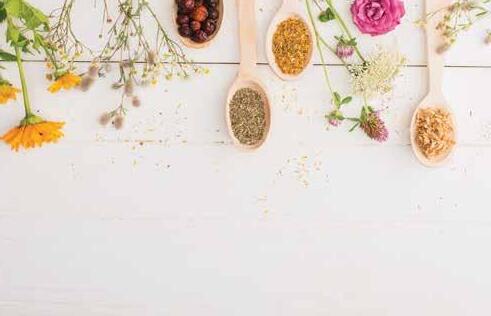
5 minute read
Celebrating Our Region’s Rich Agricultural Heritage
by Sheila Julson and Kendra Campbell
The verdant countryside of our region is home to an abundance of farmers and growers dedicated to land stewardship and humane animal husbandry. These agricultural alchemists are making the land healthier by using organic, sustainable and regenerative growing methods to restore soil health, reduce toxins and produce a local food supply plentiful with flavorful, nutrient-dense foods all year long.
Advertisement
GROFF’S FARM
Earl Groff grew up in farming. His father purchased their 10.5-acre farm in 1946. Today, Earl, his wife Edith, their son Wesley and his family care for Groff’s Farm and sell beautiful produce at the farm and at the historic Lancaster Central Market. They are conscientious about cultivating the land to produce a bounty for future generations. Groff explains that they use natural pest management methods such as soapy water, eggshells, diatomaceous earth, soybean meal and lime, which also naturally supports soil. Groff also has a greenhouse to help extend the growing season. “People love our celery,” he says. “It’s grown in our greenhouses and is sweetest in the winter months.”
Lancaster Farmacy
Elisabeth Weaver, of Lancaster Farmacy, grows medicinal herbs, flowers and produce. “We are lucky to have such fertile land to grow on in Lancaster County. We have a mix of silty and sandy loam soils, which promote good drainage, as well as good water retention,” she says. “This comes largely from the geology of the Susquehanna River Valley.” Weaver farms on land that has been fallow and chemical-free for more 20 years. This greatly increases soil fertility because the microbiology of the soil remains plentiful, which benefits the crops.
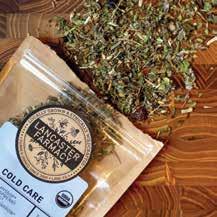
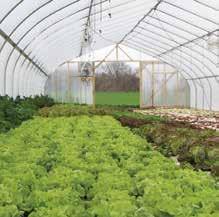
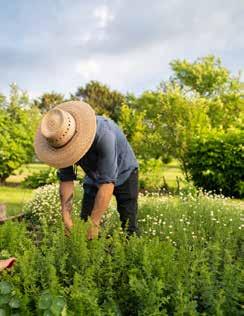
Lancaster Farmacy serves the multiple communities of humans, nature and the Earth.“The human community can source organically grown medicinal herbs and produce. It is meaningful to see the impact of growing a sanctuary of plants to support people,” Weaver enthuses. “Also, the diverse habitat we are creating when we plant annuals and perennials serves as a food source for our delicate ecosystem.”
Weaver takes pride in being a steward of the land, and always gives back by planting trees and native species. She sets up habitats to encourage beneficial insects in hopes of bringing back wild spaces while they farm.
Weaver is inspired by Lancaster Farmacy’s partnership with Unite For Her, a breast cancer wellness organization. “We regularly hear from patients going through treatment that our healing salve is one of the most effective topical products they use through their program for healing from radiation burns,” she says. “It means a lot to know that so many people receive benefits from our product, which is made of all-natural ingredients.”
Visitor Center Open House
MARCH ONLINE EXCLUSIVES >>>
Find additional articles and videos at NALancaster.com or NABerks.com Go to the home page and click on the “In This Issue” image in the top carousel or in the right column.
Wise Words
Taproot Farm
George Brittenburg and Ola Creston of Taproot Farm have always been passionate advocates for social and environmental justice, so starting a certified organic farm was a natural progression. As a firstgeneration farmer, Brittenburg looked at the food systems and saw local production and distribution and organic approaches as an essential part of solving environmental problems. “I noticed it was something I was good at through my work in community gardens. I love to do this work, though it’s hard work. It has been challenging to start a farm and keep it running for 14 years. We feel that we’ve made it successful, but it is always a challenge,” Brittenburg relates. Growing food they believe in while being good stewards of the land is their top priority. They grow 45 different varieties of vegetables, along with blueberries and strawberries, for their community supported agriculture (CSA) program and to sell at farmers markets. “We use organic methods to produce nutrient-rich foods that support and protect the environment we grow in.” the farm to pastured cattle. Boyer became involved with farm operations six years ago and continues to refine how she approaches her efforts.
She says, “Raising grass-fed beef on pasture allows for the animals to be raised on soil, rather than in a barn, which is restorative to the soil and its ecosystems. It balances the health of the animals, the land and the farmer.” She views the farm as one entity. “I consider not just what the farmer gets out of it, but what the animals and the land get out of it, as well.”
Ethically raised livestock have it much better than their factory-farmed counterparts, and Boyer notes pasture-raised farming allows her to know the herd more intimately and have healthier interactions with the animals.
Boyer knows that grass-fed beef is good for the body, more humane and is more environmentally friendly. She recalls a family that purchases her beef every year, and their young daughter always exclaims that it’s the best. “It feels good to know that I’m taking care of my neighbors,” she states.
Willow Run Farmstead
Deanne Boyer’s grandfather started Willow Run Farmstead, and when her father took over the farm he began by raising barn-kept cattle. He and Boyer then transitioned
Garden of Friedens
Friedens Church
Pastor Inge Williams inherited gardening wisdom from her farming ancestors, which she uses to serve others at a garden at Friedens Lutheran Church, in Shartlesville. Produce grown at the garden is donated to several area food pantries. While Williams’ original intent was to address food insecuri- ty and serve others, she has been surprised by how much gardening helped her grow as a person.“I witnessed the power of the soil, the miraculous unfolding of the tiny seeds, the beauty of a sunset with a hoe in hand and the ways the garden facilitated friendships among volunteers,” she relates.
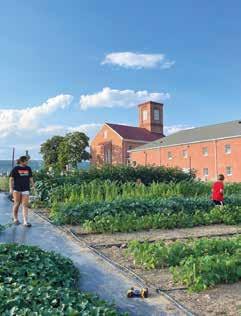
A Commitment to Sustainability

Many farmers that grow produce sustainably and regeneratively, or produce pasture-raised meats, observe that their customer’s values align with her own. “People need to trust in the integrity of the food they are eating, that it is safe to eat themselves and to feed to their children. Organic and regenerative agriculture provides that integrity, and it enhances the fertility of the farmland instead of denuding it as many conventional agricultural practices do,” Brittenburg says.
Farm Favorites
Berks and Lancaster County farmers cite many reasons to celebrate working with the land they cultivate and respect. But one of their rewards is enjoying the fruits of their labor. One of Groff’s favorite items he grows are his fresh-picked hull peas. “I eat them raw, right from the garden. Oh, there’s nothing like it,” Groff enthuses. Weaver frequently uses their fresh baby ginger and heirloom garlic in recipes. She shares, “And our refreshing hibiscus and mint iced tea hits the spot on a hot farm day.”
Groff’s Farm, 717-656-7096, Facebook.com/ groffsvegetablefarm.
Lancaster Farmacy, LancasterFarmacy@ gmail.com, LancasterFarmacy.com.
Taproot Farm, 66 Kemmerer Rd., Shoemakersville, 610-657-1927, Farmers@ TaprootFarmPA.com,TaprootFarmpa.com.
Willow Run Farmstead, 270 Hoch Rd., Fleetwood, 484-225-9151, WillowRunFarm stead@gmail.com, WillowRunFarmPA.com.
Friedens Church, 28 Wolf Creek Rd., Bernville, 610-488-7325, FriedensFolks.org.
There are opportunities for residents of all levels of physical ability. Some work indoors doing seated tasks like potato seed cutting. More active residents help with harvesting and running the farm market. Frederick adds many seniors involved with the farm have backgrounds in gardening. “I’ve also learned quite a bit while working with them,” he notes.
Before Trailside Organic Farm, Cornwall Manor had limited raised bed gardens for hobby gardeners to use for their own plots, but no large-scale farm that was available to benefit all residents. Frederick explains that the current farm space was once a wooded lot crowded with debris. Cornwall Manor Vice President for Plant Operations Paul






